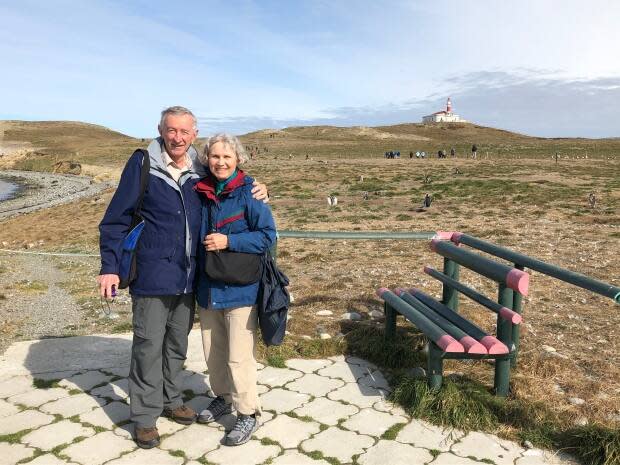How a long-term Ottawa study is shedding light on immune response to COVID-19

When Patti Murphy came down with COVID-19 in the frightening first days of the pandemic, she had no idea what she'd be in for.
"It was a remarkable time to be sick, because no one really knew anything, to be honest," said Murphy, who ended up in the ER with breathing issues and still suffers symptoms more than a year later.
It was the fact no one had a firm grip on COVID-19 that inspired Murphy to sign up for the Stop the Spread study, a long-term research project by the Ottawa Hospital Research Institute (OHRI) and the University of Ottawa.
Launched last October, the study was originally designed to monitor antibody responses to SARS-CoV-2 in high-risk workers or people who'd already come down with the disease. Since then, Murphy and roughly 1,000 others in the Ottawa region have been sending their blood, sputum or saliva samples for analysis each month.
While the initial plan was to tease out the relationship between antibodies and how sick someone got from COVID-19, or how their body responded to the vaccine, the scope has expanded significantly, said Dr. Angela Crawley, an OHRI scientist and one of the study's co-investigators.
The research team is now about to begin following 300 people from the original cohort for another two years. They're also branching out into secondary research into the role T-cells — another integral component of the body's immune system — play in the immune response.
"There's still very much to learn," said Crawley, who's also director of biobanking for the Coronavirus Variants Rapid Response Network, a research team that brings together experts from across Canada to study the science behind COVID-19 variants.
2 combatants, 1 battle
Many people likely have a degree of awareness about antibodies — proteins created after infection or vaccination that help prevent future invasions from a pathogen — and how they can offer protection against COVID-19.
But antibodies can only destroy viruses like SARS-CoV-2 when the viruses are outside the cells they use to replicate. Once they're inside, it's the T-cells, Crawley explained, that jump into action.
"[They] actively kill in a very specific manner the cells that are infected with virus," she said. T-cells have also been shown to create a "chemical micro-environment," Crawley added, that actually fosters the creation of more antibodies.
The hope is that by now studying both T-cells and antibody responses over the long term, and the delicate interplay between them, researchers will be able to design hardy vaccines that can safeguard against future variants, Crawley said.
"We know [T-cells] work in a very co-ordinated manner to drive quality antibody responses. We believe this is very important information that can help us tailor future vaccines [and] understand how well the vaccines are working."

Compelled to help
After getting sick, Murphy dutifully submitted blood and saliva samples for 10 months, getting access to data about her own antibodies in return.
That gave her insight into how her own immune system adapted and responded over time, from her initial infection up through her vaccination.
"The whole fear related to COVID is the uncertainty. And just even getting my results every month and seeing my antibodies were there [was a relief]," said Murphy.
Like Murphy, retired Ottawa couple Jim and Christine Bonta also fell ill early in the pandemic, after being stuck on board a cruise ship off the coast of South America.
We're both really happy to be involved in our own little way, making a contribution that will advance knowledge about COVID. - Jim Bonta
They also felt compelled to sign up.
"I had worked in health care all my life, and Jim had been a researcher all his career. So that was important for us, to participate," said Christine.
"We're both really happy to be involved in our own little way, making a contribution that will advance knowledge about COVID," Jim added.
Crawley said the "thousands and thousands of specimens" collected over the course of the Stop the Spread study from people like Murphy and the Bontas also meant researchers could establish a baseline for antibody and T-cell responses before COVID-19 vaccines came out — something post-vaccination studies won't necessarily have.
It all means the participants make up "one of the most valuable cohorts in the country," she said. Modelling already suggests a person's experience with a run-of-the-mill seasonal cold caused by a coronavirus may determine how sick they get from COVID-19, Crawley said.
For Murphy, hearing those sorts of comments far outweighs any mild discomfort from taking part.
"You pricked your finger once a month and spit into a tube. It wasn't too much," she said. "Knowing that they can even have that data, and they can compare perhaps my [case] to people who have been infected more recently ... it feels really good to have been part of it."

